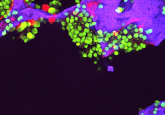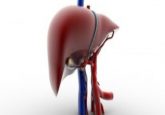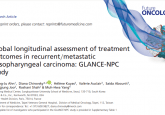RATIONALE 311: tislelizumab plus concurrent chemoradiotherapy for localized esophageal squamous cell carcinoma

This clinical trial protocol, which has been recently been published in our partner journal Future Oncology, describes the design and rationale of RATIONALE 311, an ongoing multicenter Phase III, randomized, double-blind, placebo-controlled study. RATIONALE 311 is investigating tislelizumab combined with concurrent chemoradiotherapy (cCRT) compared with placebo plus cCRT in patients with inoperable localized esophageal squamous cell carcinoma (ESCC) (BGB-A317-311; NCT03957590). The study will recruit approximately 366 patients from approximately 32 centers in China. The primary objective of the study is to compare progression-free survival, as assessed by a Blinded Independent Review Committee per RECIST v1.1. Secondary objectives include a comparison of tislelizumab plus cCRT with the placebo control in terms of efficacy assessments (overall response rate, duration of response, overall survival) and measures of health-related quality of life, as well as safety/tolerability. The authors hope this study may help to address the unmet need for new therapeutic options for patients with localized ESCC.
ABSTRACT
Definitive chemoradiotherapy (CRT) is the standard of care for inoperable locoregionally advanced ESCC. Immune checkpoint inhibitors (CPIs) such as anti-PD-1/L1 antibodies have led to a paradigm shift in advanced, metastatic ESCC treatment; however, the effect of incorporating CPIs in the definitive management of ESCC is unclear. Tislelizumab is an anti-PD-1 antibody specifically engineered to minimize FcɣR binding on macrophages to abrogate antibody-dependent phagocytosis, a mechanism of T-cell clearance and potential resistance to anti-PD-1 therapy. The RATIONALE 311 study described here (BGB-A317-311; NCT03957590) is a registrational multicenter, double-blind, placebo-controlled, randomized, Phase III clinical trial designed to evaluate the efficacy and safety of tislelizumab combined with concurrent CRT in patients with inoperable localized ESCC.
Lay abstract
Esophageal cancer is a challenging disease that seriously threatens patients’ health and life. ESCC is the most common type of esophageal cancer. Most patients who have inoperable stage II–IV ESCC are currently treated with a sequential combination of chemotherapy and radiation therapy, with the hopes of increasing the positive effects seen from either therapy alone. Immune checkpoint inhibitors such as anti-PD-1/L1 antibodies have shown encouraging results in patients with ESCC, but it is not known if combining checkpoint inhibitors with simultaneous chemotherapy and radiation therapy will provide additional benefits. The safety and efficacy of tislelizumab, an anti-PD-1 antibody specifically engineered to limit potential resistance to anti-PD-1 therapy, is being investigated in combination with simultaneous chemotherapy and radiation therapy in patients with inoperable stage II–IV ESCC in an actively enrolling clinical trial, RATIONALE 311 (NCT03957590). Our trial in progress article explains the reason RATIONALE 311 was started and provides important enrollment information for doctors.
Read the full paper titled ‘RATIONALE 311: tislelizumab plus concurrent chemoradiotherapy for localized esophageal squamous cell carcinoma’ here.





